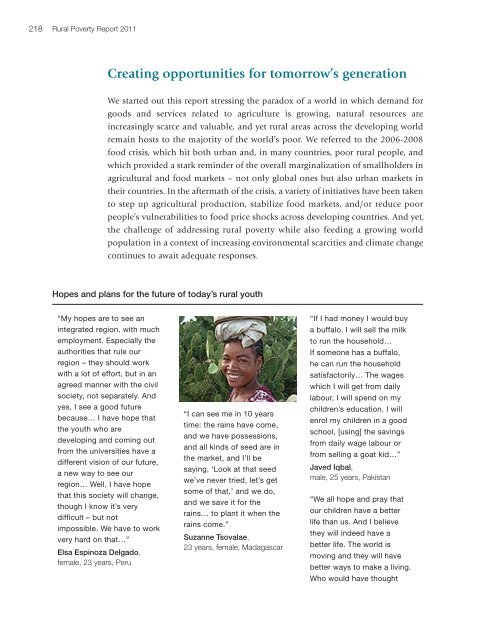English - IFAD
English - IFAD
English - IFAD
Create successful ePaper yourself
Turn your PDF publications into a flip-book with our unique Google optimized e-Paper software.
218<br />
Rural Poverty Report 2011<br />
Creating opportunities for tomorrow’s generation<br />
We started out this report stressing the paradox of a world in which demand for<br />
goods and services related to agriculture is growing, natural resources are<br />
increasingly scarce and valuable, and yet rural areas across the developing world<br />
remain hosts to the majority of the world’s poor. We referred to the 2006-2008<br />
food crisis, which hit both urban and, in many countries, poor rural people, and<br />
which provided a stark reminder of the overall marginalization of smallholders in<br />
agricultural and food markets – not only global ones but also urban markets in<br />
their countries. In the aftermath of the crisis, a variety of initiatives have been taken<br />
to step up agricultural production, stabilize food markets, and/or reduce poor<br />
people’s vulnerabilities to food price shocks across developing countries. And yet,<br />
the challenge of addressing rural poverty while also feeding a growing world<br />
population in a context of increasing environmental scarcities and climate change<br />
continues to await adequate responses.<br />
Hopes and plans for the future of today’s rural youth<br />
“My hopes are to see an<br />
integrated region, with much<br />
employment. Especially the<br />
authorities that rule our<br />
region – they should work<br />
with a lot of effort, but in an<br />
agreed manner with the civil<br />
society, not separately. And<br />
yes, I see a good future<br />
because… I have hope that<br />
the youth who are<br />
developing and coming out<br />
from the universities have a<br />
different vision of our future,<br />
a new way to see our<br />
region… Well, I have hope<br />
that this society will change,<br />
though I know it’s very<br />
difficult – but not<br />
impossible. We have to work<br />
very hard on that…”<br />
Elsa Espinoza Delgado,<br />
female, 23 years, Peru<br />
“I can see me in 10 years<br />
time: the rains have come,<br />
and we have possessions,<br />
and all kinds of seed are in<br />
the market, and I’ll be<br />
saying, ‘Look at that seed<br />
we’ve never tried, let’s get<br />
some of that,’ and we do,<br />
and we save it for the<br />
rains… to plant it when the<br />
rains come.”<br />
Suzanne Tsovalae,<br />
23 years, female, Madagascar<br />
“If I had money I would buy<br />
a buffalo. I will sell the milk<br />
to run the household…<br />
If someone has a buffalo,<br />
he can run the household<br />
satisfactorily… The wages<br />
which I will get from daily<br />
labour, I will spend on my<br />
children’s education. I will<br />
enrol my children in a good<br />
school, [using] the savings<br />
from daily wage labour or<br />
from selling a goat kid…”<br />
Javed Iqbal,<br />
male, 25 years, Pakistan<br />
“We all hope and pray that<br />
our children have a better<br />
life than us. And I believe<br />
they will indeed have a<br />
better life. The world is<br />
moving and they will have<br />
better ways to make a living.<br />
Who would have thought

















